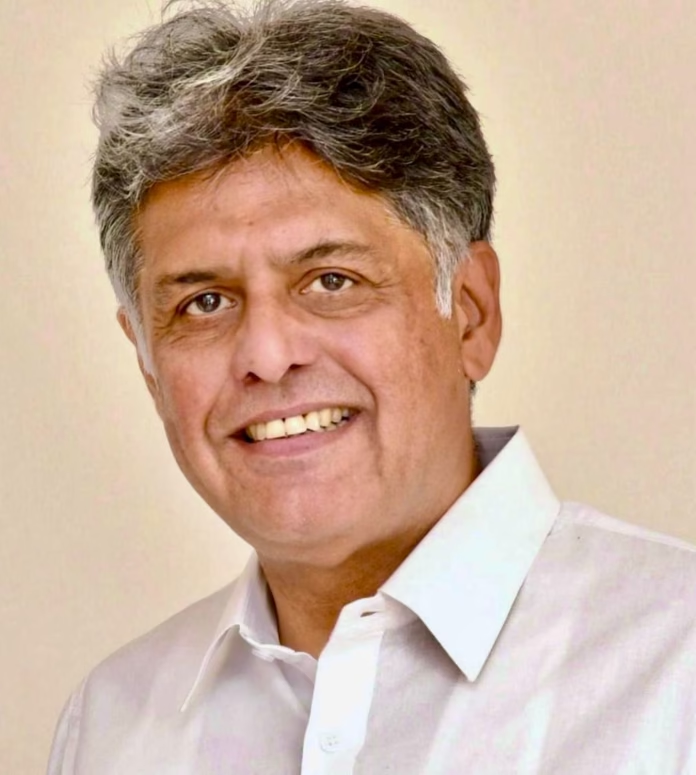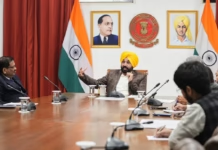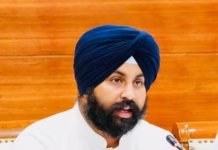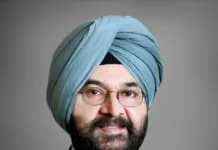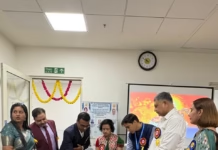MP Manish Tewari Writes to CAG, Demands a Detailed Performance Audit of the Smart City Water Supply Project, Especially the Manimajra Pilot Project
Bahadurjeet Singh/Chandigarh/ royalpatiala.in News/ October 26,2025
Chandigarh MP and former Union Minister Manish Tewari has written to the Comptroller and Auditor General of India (CAG), K. Sanjay Murthy, emphasizing the urgent need for a comprehensive performance audit of the 24×7 Water Supply Project under the Smart City Mission, particularly the Manimajra pilot project in Chandigarh.
In his letter, Tewari stated that he wished to draw the CAG’s attention to the necessity of conducting a detailed performance audit of the 24/7 water supply scheme implemented under the Central Government’s Smart City Mission in Chandigarh.
He noted that this project—funded by public money and supported by international agencies—has failed to deliver on its promises, raising serious concerns regarding financial prudence, implementation efficiency, and governance accountability.
Tewari mentioned that the Smart City Mission, launched in 2015, aimed to develop citizen-friendly and sustainable urban infrastructure. Under this initiative, Chandigarh Smart City Limited (CSCL) was assigned several projects, including a key 24/7 pressurized clean water supply initiative with an estimated total project cost of ₹591.57 crore.
In 2016, Chandigarh signed an agreement with the Agence Française de Développement (AFD) for cooperation in water supply, sanitation, and waste management. Under this framework, the Detailed Project Report (DPR) for the citywide 24/7 water supply project was approved by the Municipal Corporation of Chandigarh (MCC) in December 2019.
Later, in December 2022, the MCC signed another agreement for the phased replacement of 270 km of water pipelines and coverage of 55 District Metering Areas (DMAs) by 2029. This pan-city project was planned with a total expenditure of ₹510 crore, including an AFD loan of ₹412 crore (to be repaid over 15 years) and a European Union grant of ₹98 crore.
Tewari said that upon completion, the project was expected to make Chandigarh the first city in India with 24-hour access to clean drinking water.
However, the Manimajra pilot project, implemented at a cost of ₹166.06 crore under the Smart City Fund, has completely failed.
He revealed that due to the poor performance of the pilot, the MCC is now considering scrapping the entire citywide project, as not a single area in Manimajra currently receives uninterrupted, high-pressure water supply.
Residents have complained of foul-smelling and dirty water, as well as malfunctioning water meters. These findings contradict residents’ experiences, media reports, and on-ground realities. Tewari stated that citizens consistently report receiving water for only 2–4 hours a day, which is often contaminated and unfit for consumption.
According to several local media reports, MCC officials themselves confirmed that although the project was designed to improve water services, the actual quantity of water reaching households has not increased.
Despite this, the Ministry of Home Affairs, in its reply to Unstarred Question No. 1226 (answered on February 11, 2025) in the Lok Sabha, claimed that the physical infrastructure and trial operations of the project had been completed.
Tewari further pointed out additional discrepancies between government claims and ground reality. In response to his Unstarred Question No. 2768 (answered on December 12, 2024), the government stated that out of 36 projects worth ₹1,537 crore under CSCL, 34 projects worth ₹1,475 crore had been completed.
Regarding the Manimajra project, the government claimed that water supply hours had been increased from 9 to 18 hours per day, 12,700 smart water meters had been installed, water supply had risen from 2.5 to 3.5 MGD, and water quality was being ensured through chlorine analyzers and daily testing.
However, MCC officials have drafted a proposal urging the Central Government to halt the project, warning that it is financially unviable. The original ₹412 crore loan (calculated at 2022 prices) is expected to nearly double due to inflation and rising operational costs. Similarly, water tariffs would need to be almost doubled to meet repayment obligations, placing a heavy financial burden on residents.
The DPR also failed to include major costs such as road re-carpeting, which will require crores of additional expenditure once the underground pipelines are replaced across the city.
Government responses have themselves admitted that the citywide 24×7 water supply project has achieved only 5% physical progress, while another project—an animal carcass incinerator—showed 0% progress as of December 3, 2024.
Tewari also noted that in July 2025, following corruption allegations made by Chandigarh BJP President Jatinder Pal Malhotra, the UT Vigilance Department initiated an inquiry. However, the MCC provided only incomplete records, consisting merely of tender documents and noting files, instead of the complete project documentation.
Media reports have suggested that the vigilance investigation has been deliberately derailed, with vested interests allegedly attempting to suppress evidence and influence the inquiry process.
Taking suo motu cognizance, the Punjab State Human Rights Commission issued notices to both the Vigilance Department and the MCC, directing them to appear on August 31, 2025, and submit reports before the September 2 hearing.
Tewari mentioned that while multiple agencies are investigating the project’s failure, no independent third-party evaluation of water quality or service standards has been conducted so far. He added that reliance on self-reported CSCL data is unreliable, and the lack of clarity over loan arrangements further undermines the credibility of official statements—highlighting the need for independent financial verification.
Given the MCC’s own acknowledgment of the project’s complete failure and its consideration of scrapping the initiative, Tewari said that an independent execution audit has become essential to assess public fund mismanagement and to prevent similar failures in other cities.
He therefore requested the CAG to conduct a comprehensive performance audit, covering the following points:
- Verification of total project cost and funding sources (₹166.06 crore from Smart City Mission, ₹412 crore AFD loan, ₹98 crore EU grant)
- Clarification of financial structure and forensic review of contradictory official statements
- Compliance with procurement procedures for contractor selection and fund allocation
- Fund flow tracking and financial management by CSCL and MCC
- Technical implementation versus specified deliverables, including SCADA systems and water quality benchmarks
- Coordination between implementing agencies and oversight bodies
- Assessment of DPR adequacy, including road restoration and inflation adjustments
- Value-for-money evaluation in light of the project’s failure
- Decision-making processes that allowed continuation despite early warning signs
- Factors leading to MCC’s current decision to consider scrapping the project
Tewari concluded that this issue involves significant public funds and directly affects public health and essential services for the people of Chandigarh. Therefore, it merits an independent and official investigation, which only the CAG’s office is authorized to conduct.
In view of these circumstances, he urged the CAG to intervene immediately to ensure accountability and transparency in the project’s implementation.

